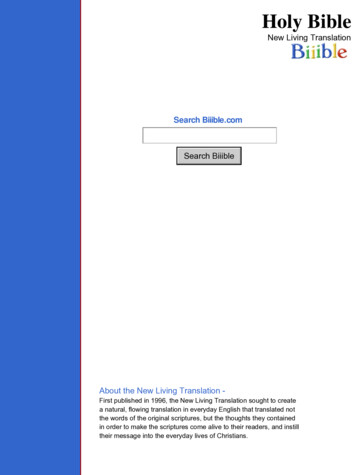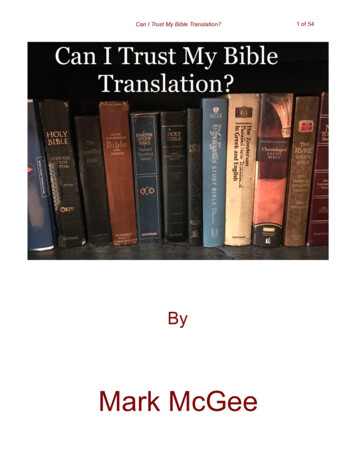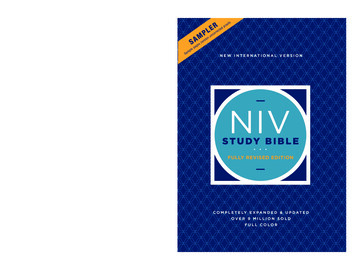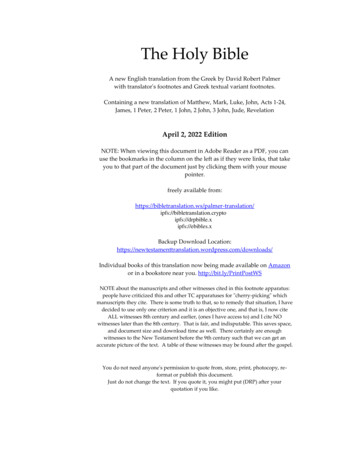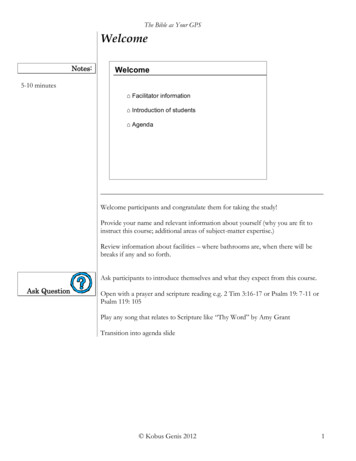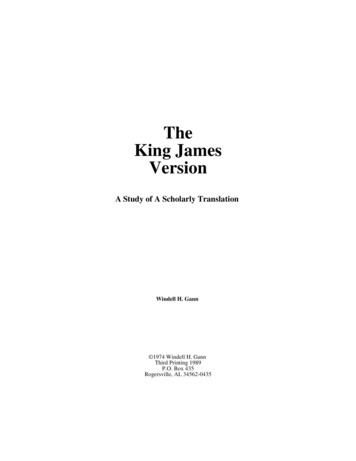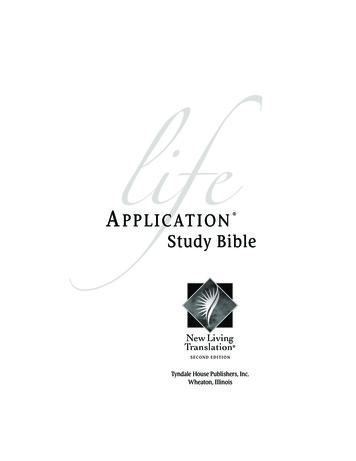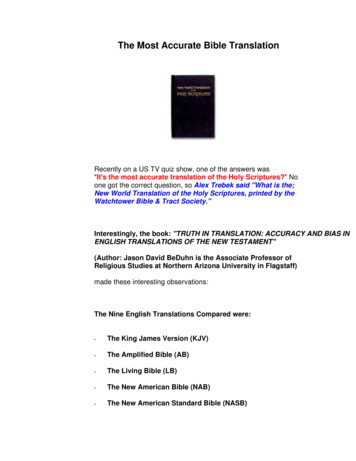
Transcription
The Most Accurate Bible TranslationRecently on a US TV quiz show, one of the answers was"It's the most accurate translation of the Holy Scriptures?" Noone got the correct question, so Alex Trebek said "What is the;New World Translation of the Holy Scriptures, printed by theWatchtower Bible & Tract Society."Interestingly, the book: "TRUTH IN TRANSLATION: ACCURACY AND BIAS INENGLISH TRANSLATIONS OF THE NEW TESTAMENT"(Author: Jason David BeDuhn is the Associate Professor ofReligious Studies at Northern Arizona University in Flagstaff)made these interesting observations:The Nine English Translations Compared were:-The King James Version (KJV)-The Amplified Bible (AB)-The Living Bible (LB)-The New American Bible (NAB)-The New American Standard Bible (NASB)
-The New International Version (NIV)-The New World Translation (NW)-The (New) Revised Standard Version (NRSV)-Today's English Version (TEV)EXCERPTS FROM HIS BOOK:Chapter Four: Examples of translation of the Greek word"proskuneo", used 58 times in the New Testament. The word istranslated various ways as worship, do obeisance, fall down onone's knees, bow before. Scriptures discussed include Matt. 18:26;Rev. 3:9; Mark 15:18,19; Matt 2:1, 2, 8,11; Matt 14:33; Matt 28:9, ".In our exploration of this issue, we can see how theological biashas been the determining context for the choices made by all of thetranslations except the NAB and NW. Translators seem to feel theneed to add to the New Testament support for the idea that Jesuswas recognized to be God." Regarding Matt. 28:16, 17, where allversions except the NW use "worship" where the NW uses "didobeisance": "Here all translations except the NW have recourse to"worship" -- a rendering which makes no sense in this context. Thiscontradiction seems to be missed by all the translators exceptthose who prepared the NW."Chapter Five: A discussion of Philippians 2:5-1 1: "The NWtranslators. Have understood "harpagmos" accurately as graspingat something one does not have, that is, a "seizure." The literarycontext supports the NW translation (and refutes the KJV's "thoughtit not robbery to be equal)."Chapter Seven A discussion on Col. 1: 15-20: "It is a tricky passagewhere every translation must add words." "The LB translator is guilty of all the doctrinal importation discussed above with reference tothe NIV, NRSV, and TEV, and even surpasses them in this respect.So it is the NIV, NRSV, TEV and LB -- the four Bibles that make noattempt to mark added words - that actually add the most significanttendentious material. Yet in many public forums on Bibletranslation, the practice of these four translations is rarely if ever
pointed to or criticized, while the NW is attacked for adding theinnocuous "other" in a way that clearly indicates its character as anaddition of the translators. But the NW is correct. "Other" is impliedin "all", and the NW simply makes what is implicit explicit. It isironic that the translation of Col. 1:15-20 that has received the mostcriticism is the one where the "added word s" are fully justified bywhat is implied in the Greek."Chapter Eight : A discussion on Titus 2:13; 2 Thess. 1:12; 2 Peter1:1, 2: ". The position of those who insist "God" and "Savior" mustrefer to the same being. Is decidedly weakened."Chapter Nine: A discussion of Hebrews 8:1: "so we must concludethat the more probable translation is "God is your throne., "thetranslation found in the NW. It seems likely that it is only becausemost translations were made by people who already believe thatJesus is God that the less probable way of translating this versehas been preferred."Chapter Ten: A discussion on John 8:58: "Both the LB and the NWoffer translations that coordinate the two verbs in John 8:58according to proper English syntax, and that accurately reflect themeaning of the Greek idiom. The other translations fail to do this.""There is absolutely nothing in the original Greek of John 8:58 tosuggest that Jesus is quoting the Old Testament here, contrary towhat the TEV tries to suggest by putting quotations marks around "Iam.""The majority of translations recognize these idiomatic uses of "Iam", and properly integrate the words into the context of thepassages where they appear. Yet when it comes to 8:58, theysuddenly forget how to translate." "All the translations except the LBand NW also ignore the true relation between the verbs of thesentence and produce a sentence that makes no sense in English.These changes in the meaning of the Greek and in the normalprocedure for translation point to a bias that has interfered with thework of the translators." "No one listening to Jesus, and no onereading John in his own time would have picked up on a divine selfidentification in the mere expression "I am," which, if you thinkabout, is just about the most common pronoun-verb combination in
any language." "The NW. understands the relation between thetwo verbs correctly. The average Bible reader might never guessthat there was something wrong with the other translations, andmight even assume that the error was to be found in the. NW."Chapter Eleven: A discussion of John 1:1: "Surprisingly, only one,the NW, adheres to the literal meaning of the Greek, and translates"a god." "Translators of the KJV, NRSV, NIV, NAB, NASB , AB ,TEV and LB all approached the text at John 1:1 already believingcertain things about the Word. and made sure that the translationscame out in accordance with their beliefs. . Ironically, some ofthese same scholars are quick to charge the NW translation with"doctrinal bias" for translating the verse literally, free of KJVinfluence, following the sense of the Greek. It may very well be thatthe NW translators came to the task of translating John 1:1 with asmuch bias as the other translators did. It just so happens that theirbias corresponds in this case to a more accurate translation of theGreek" "Some early Christians maintained their monotheism bybelieving that the one God simply took on a human form and cameto earth -- in effect, God the Father was born and crucified as Jesus.They are entitled to their belief, but it cannot be derived legitimatelyfrom the Gospel according to John.""John himself has not formulated a Trinity concept in his Gospel.""All that we can ask is that a translation be an accurate startingpoint for exposition and interpretation. Only the NW achieves that,as provocative as it sounds to the modern reader. The othertranslations cut off the exploration of the verse's meaning before ithas even begun."Chapter Twelve: A discussion of holy spirit: "In Chapter Twelve, notranslation emerged with a perfectly consistent and accuratehandling of the many uses and nuances of "spirit" and "holy spirit."The NW scored highest in using correct impersonal forms of therelative and demonstrative pronouns consistently with the neuternoun "holy spirit," and in adhering to the indefinite expression "holyspirit" in those few instances when it was used by the Biblicalauthors."
Summary: ". it can be said that the NW emerges as the mostaccurate of the translations compared.the translatorsmanaged to produce works relatively more accurate and lessbiased than the translations produced by multi-denominationalteams, as well as those produced by single individuals.""Jehovah's Witnesses. really sought to re invent Christianityfrom scratch. building their system of belief and practicefrom the raw material of the Bible without predetermining whatwas to be found there. Some critics, of course, would say thatthe results of this practice can be naive. But for Bibletranslation, at least, it has meant a fresh approach to the text,with far less presumption than that found in may of theProtestant translations."".Most of the differences are due to the greater accuracy ofthe NW as a literal, conservative translation of the originalexpressions of the New Testament."Commenting on bias in translation : "To me, it expresses a lackof courage, a fear that the Bible does not back up their "truth"enough. To let the Bible have its say, regardless of how well orpoorly that say conforms to expectations or accepted forms ofmodern Christianity is an exercise in courage or, to useanother word for it, faith."For those that want to add this book to their library, it'savailable on Amazon.com.
- The New International Version (NIV) - The New World Translation (NW) - The (New) Revised Standard Version (NRSV) - Today's English Version (TEV) EXCERPTS FROM HIS BOOK: Chapter Four : Examples of translation of the Greek word "proskuneo", used 58

